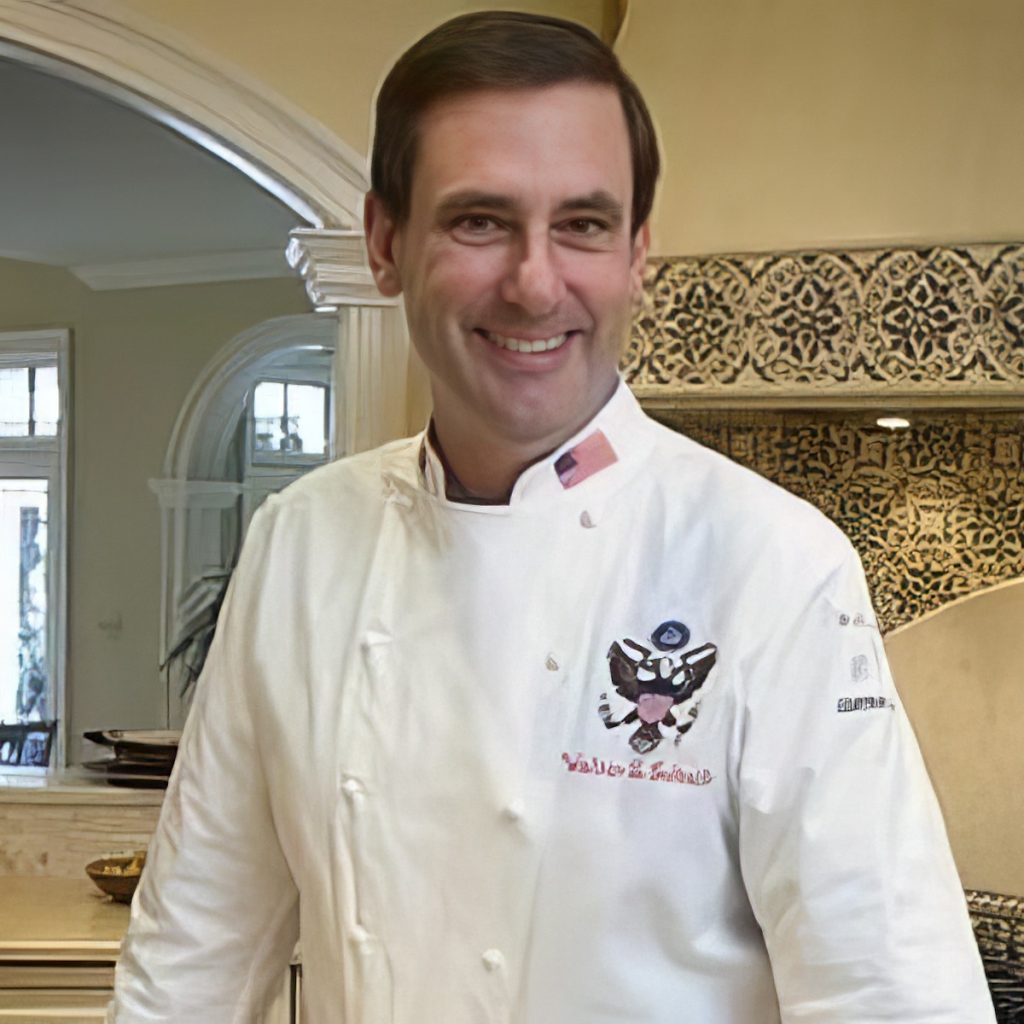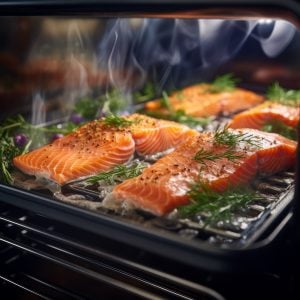“Using just a few excellent ingredients, anyone can make a perfect meal with very little formal training.” – Chef Walter Scheib
Interview with White House Chef Walter Scheib
This hobby of mine is getting more fun every day. This time I get to interview Chef Walter Scheib, the executive chef in the White House for 11 years from 1994 to 2005. Here is a man who not only was responsible for most of the meals eaten by our President and his family, but the many heads of states who visited the White House each year. From small personal gatherings, to large State dinners, Chef Scheib was responsible for getting the food out to the table.
What I really appreciate about Chef Scheib’s answers are how candid they are and the great advice he gives to novice home cooks, but also to those interested in attending culinary school.
Chef, thank you for taking the time to participate in my Reluctant Gourmet Novice2Pro interview. In my interviews, I try to approach cooking from a novice’s point of view and educate my readers from your responses. I’m sure you get thousands of questions about your experiences in the White House and I too am interested in learning about your experiences but I would prefer to direct my readers to your American Chef web site, blog and book, White House Chef: Eleven Years, Two Presidents, One Kitchen for those details and focus more on your background and culinary advice.
Saying that, I did ask my 11 year old daughter if there was one question you could ask the White House executive chef, what would it be? She wanted to know if the President and his family can really order anything they want 24/7 and if so, how do you stock the pantry to include everything?
The first family can get anything they want at any time. Although this sort of off hours dining is not the norm, the White House is not a hotel or a restaurant. It is a private home. So you spend a lot of time learning in great depth the likes and dislikes of the family and their daily schedule. Cooks are on duty from about 5:00 AM to about 10:00 PM and there is an overnight usher that is available 24/7 if there is a late night request. The family’s private kitchen is well stocked with all of their favorites if they want to grab something quick.
Now, with that out of the way, can you tell us when you decided to become a professional chef and was there anyone in particular who influenced your decision?
I think in some ways I was born to be a cook or chef. Many of my earliest memories were of food or cooking or eating, both in my home and at friends’ homes and restaurants. In the same way as many musicians, painters or writers, I had an aptitude for my craft from a very early age. I thought that this skill was common or natural to all. I learned later that it wasn’t common and as I developed this aptitude I progressed in my skills.
My mother was my biggest backer in a time before celeb chefs and TV shows on cooking made it popular. The one thing that made me realize that this aptitude I had could become a career was my first visit to the CIA in Hyde Park New York. It was a complete eye opening and I came away from the visit with a clear idea where my skills could lead.
As part of the Culinary Institute of America’s graduating class of 1979, what was your culinary school experience like and do you feel it prepared you for your career in the food industry?
As a Culinary Institute of America grad I had two experiences that I look back on as what helped me find direction in my career. The first was to be exposed to a wide variety of cuisines and techniques that were new to me. This opened my eyes to the vastness of the world’s cuisine and cooking styles. The second and I think more important lesson was the existence of a third way. In the 70s the two culinary role models available to young cooks were the over-the-top semi-crazed “French chef” and the T-shirt wearing cigarette smoking “Mel’s Diner” cook.
The CIA showed that there was a different way with extremely talented, education driven chef instructors and a student body that worked to expand both their abilities and the scope of their knowledge. This rethinking of what the food profession was and could be was my most valuable lesson from the CIA.
Were there any funny incidents you can remember happening while you were at school?
I entered CIA at 23, several years older than most of my classmates. I had already been working for several years in the “real world” to support myself. So for me taking time out to go to school was a big gamble and one I took very seriously. I had very clear and defined goals for my time at school as I knew firsthand what was waiting on the other side of the school’s doors. So unlike many of my classmates, I was a very serious and motivated student. I remember having lots of fun, but not too many funny experiences, as I was usually studying or working in my off hours.
After you graduated, what was your first job as a professional cook and what was that like?
My first job after the CIA was as the banquet chef at the Capitol Hilton, a 700 room major full-service hotel in downtown Washington DC. There was lots of work and many challenges offered to a young and fairly inexperienced chef. It was a tremendous opportunity to work hard to learn and to meet the challenges encountered daily. Within two years, I had been promoted to sous chef then to executive sous chef and finally to executive chef at age 27. Apparently I did manage to meet the challenges in the eyes of my bosses.
As White House executive chef, did you ever hire cooks right out of culinary school and if so, what criteria were required to be part of the team?
No, this was based on both the need to have fully experienced and qualified chefs as well as the need to know the chefs well based on security concerns.
Are there specific traits you looked for that were essential?
The traits I look for in a Cook or Chef are as follows:
- A deep seated and heartfelt desire to serve and please the guest above all else. This is paramount, no matter what style or level of cuisine you are working on, if the guest isn’t happy and doesn’t want to return, you have failed.
- Intelligence and intellectual curiosity. I look for people not only with broad culinary knowledge but also with many nonfood interests and expertise. This makes for a more flexible and interested staff as it’s not only or always food being spoken about in the kitchen.
- Seriousness about the profession. Too many young cooks see culinary work as a big party all the time. Late nights, the camaraderie of battle, cash wages, alcohol and drugs are common in many kitchens and our potential distractions. You have to not get caught up in these distractions as they will get between the cook and the cook’s goal of progressing in their career. The work should be fun, but remember it’s a profession not a party.
- The emotional and physical stamina to deal with the stress and demands of the kitchen and the steady and appropriate manner.
I have many high school students come to my site who are interested in attending culinary school. I was wondering what advice would you give them before taking that big step?
See number one under traits in the above question. If they don’t have the heart and motivation, they should look at a different career.
I noticed you saying on www.theamericanchef.com, “Using just a few excellent ingredients, anyone can make a perfect meal with very little formal training.” I think it is so important to get that message to home cooks but find so many of them afraid to try new ideas and depending on the same seven or eight recipes week after week. What advice would you give them to help get them out of their cooking ruts?
- Take a few lessons in a local cooking school to learn the basic skills needed to be comfortable in a kitchen.
- Read or look at a wide variety of cookbooks, magazines and web sites to expand their exposure to new or different styles and ingredients not so much for the actual recipes as for ideas and inspirations.
- Get to know sources of great ingredients. Get to know local farmers, co-ops, the department managers at your grocery store or food shops. These are all great resources and finding out what is ripe and delicious in each season of the year.
- Be spontaneous in your cooking. Don’t get bogged down with the details of recipes. Cook based on simple techniques and great recipes. Recipes are like sheet music, if you don’t do your own interpretation, you are only a cover band.
From your experiences with The American Chef cooking classes and team building, what mistakes do you find novice cooks making over and over again and what can they do to avoid them?
Trying to impress people with their cooking prowess rather than concentrating on making the flavors wonderful.
What are your favorite cookbooks that you would recommend every home cook own and why?
I have over 1,500 cookbooks and love them all. They are my friends and help me travel the world without ever leaving my kitchen. These books, as your friends, should be selected on the basis of how happy they make you and how easy they are to be around. And like good friends, they will stay with you for years.
Do you have a signature dish or a favorite you can share with us?
My favorite dish is the next one someone cooks for me. What makes a great dish really isn’t a recipe or venue it’s served in, but the friendship and conversation that comes as a side dish with the entree.
How did you become involved with the Celebrity Chef Tour dinner at The W Hotel on April 23rd, and what motivated you to participate?
I’ve known Jeff Black with the Tour for a number of years and he always has unique opportunities for me, and I’m happy to work with him on any project.
One last White House question I’m sure you get asked all the time if you don’t mind. Did any heads of state, and of course you don’t have to name names, bring tasters to any of your dinners and if so what was your reaction when it happened?
No tasters were ever present to my knowledge, if they had been, it wouldn’t have made any difference to me.
Thank you so much for doing this interview. There are so many more questions I would love to ask and hope we can do this again some time in the future.





One Response
Hi there. You used to have a lovely simple shrimp risotto recipe on your site. Please help. I tried it once and it was divine!!
Thank for pointing this out. The page was not brought over when I redid the site. You can find it at http://www.reluctantgourmet.com/shrimp-risotto-with-shrimp/ – RG